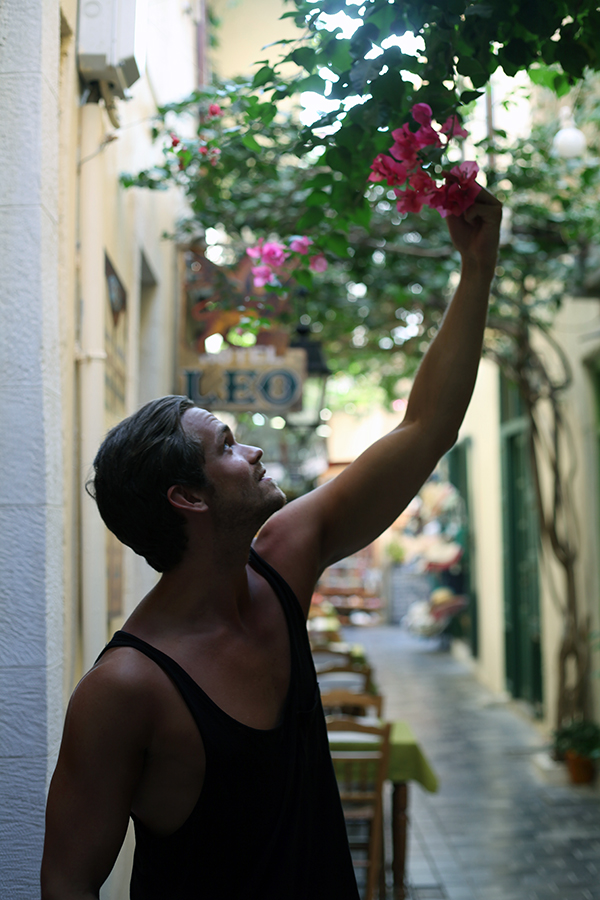Í janúar þegar ég fór til Egyptalands með karlinum mínum þá byrjaði ég fyrstu tvo dagana þar einn. Flaug einn þangað og reyndi að halda sjálfum mér félagsskap í þessu ókunnuga landi í rúmlega 2 daga. Ég var smá ómögulegur þarna seint um nóttina þegar ég átti að fljúga og rak augun í þessa bók sem hét ‘ How to be happy ‘ eftir Liggy Webbs
Ég hef aldrei hugsað til þess að lesa sjálfshjálparbækur og hugsaði með mér að ég er ekki týpan sem kaupir bók þar sem maður lærir að vera hamingjusamur, þar sem ég tel sjálfan mig vera hamingjusaman einstakling. Ég ákvað þó að slá til og kaupa bókina eftir að ég las nokkrar setningar í bókinni sem vakti áhuga minn.
Bókin hélt áfram að vekja áhugann minn, opna augun mín og víkka sjóndeildarhringinn minn. Bókin var í rauninni lærdómur inná við og skilar sér andlegum árangri enn í dag. Ég kláraði ekki bókina svo ég ákvað að taka hana með mér til Krít og rifja upp og fræða mig meira.
Fyrir tveimur árum hefði ég líklegast aldrei einu sinni íhugað bók af þessari tegund þar sem ég var vissum að ég mundi finna hamingju í rísandi ferli, djammi, vera “kúl gaur”, fölskum vonum og vera umkringdur fólki sem var á háum staðli innan íslenska tískubransans. Ég beið eftir að hamingjan mundi finna mig. En máltækið “Þú ert þinn eigin gæfusmiður” hefur meiri þýðingu en flestir gera sér grein fyrir. Snemma á árinu 2012 flutti ég aftur heim til Seyðisfjarðar þar sem ég tók í “Life coaching” prógram, tók sjálfan mig andlega í gegn, horfðist í augu við gallana og mistökin og nýtti mér það til lærdóms og byggði mig upp á jákvæðan og raunhæfan máta. Það er án efa besta ákvörðun sem ég hef nokkurntíman tekið í lífi mínu.
Hér eru nokkrar setningar úr bókinni sem vöktu áhuga minn, nokkuð margar – en ég vona að þið kunnið að meta það x
“It is important also to be aware that you feed your emotions with your thoughts.”
“You are the nutritionist of your soul.”
“It helps to remember that, at the bedrock of your thoughts and emotions, are your values and beliefs – deep-rooted ideas that are a result of all your life experiences. These are your life attitudes and they colour and shape your perception of the world.”
“I was delighted to find that a new word has been introduced into our vocabulary called ‘ probortunity ‘. This inclusive word combines the word problem and opportunity to describe something you want to improve and change for the better. When faced with any problem at home or in the workplace, try replacing the word problem with opportunity and, rather than focus on the negatives, actively seek out all the solutions and possibilities. Become a possibilitarian.”
“Positive thinking and positive self talk is a habit anyone can adopt with some practice, irrespective of their background, education and experience.”
“Remember: you control your habits – they do not control you. Your life is the culmination of all the daily behaviours that you have.”
“You are where you are right now because of the behaviours that you’ve adopted in the past.”
“Behind all of these habits and behaviours lies a reason. Changing a bad behaviour without addressing the root cause of the problem will only lead to a regression”
“Creating and maintaining a positive attitude is the most efficient and low-cost investment you can make in order to improve your life.”
“By embracing responsibility you will reap many awards.”
“Certainly some of the best learning and character-building experiences I have been through are on the back of big mistakes.”
“I have a huge amount of respect for people who are brave enough to admit when they don’t get something right and have the humility to accept it, acknowledge it and then positively move on.”
“You choose how you respond and ultimately feel.”
“When you feel good about yourself, others will feel good about you, too.”
“The acorn has the ability to grow into an oak tree and you have the opportunity, every single day of your life, to spread the branches within your mind and explore how to be the best you can be.”
“What is your true opinion of yourself? Are you appreciative of all your strengths and qualities? Or do you beat yourself up on a regular basis about your misgivings, mistakes and weaknesses? If it is the latter, I am sure that you would not consciously treat anyone else, let alone your best friend, that way. So why do we do it to ourselves? Why are we sometimes our own worst enemy?”
“It is amazing how many people receive a compliment by rejecting it, rather than simply saying thank you and allowing themselves to feel the benefits of appreciation.”
“Take time to have a little chat with yourself. Be kinder, be more considerate, be more positive.”
“Self-awareness is the first step in the creation process. As you grow in self-awareness, you will understand better why you feel what you feel and behave as you behave.
“Without fully knowing who you are, self-acceptance and change is impossible.”
“Receiving feedback can also be challenging. It is the food of progress. However, like some foods, while it may be good for us, it can also be a little unpleasant to digest.”
“Am I feeling peaceful; doing my best for my health? Do I have an attractive mind and healthy interactions with other people?”
“Being the best that we can be is the most realistic ambition. We are essentially people in progress. I like this concept. It means that we can always improve, and as long as we head in the right direction with the right intention, then every breath we take is a breath worth taking.”
“Every human being has the means to take control and make positive changes. Other people can try and stop you, but only if you let them.”
“By looking for the best in others, you will, indirectly, bring out the best in yourself.”
“Having the discipline to exercise not only makes you feel better; it creates positive momentum that you can build on for the rest of the day.”
“Excuses are harmful.”
“When we make excuses, and repeat them often enough, they become a belief.”
“Add a space to ‘ impossible ‘ and it becomes ‘ I’m possible ‘”
“Positive self-talk is a great way to improve your energy levels.”
“The greatest wealth is health.”
“A pill might take away the pain, but it does not get rid of the problem.”
“Happiness resides not in possessions and not in gold. The feeling of happiness dwells in the soul.”
“The way we think determines the way that we feel and is the control pad for the volume of happiness that we choose to experience in our lives. The quality of thinking essentially determines the quality of life.”
“Your perspective is your reality and your reality is your perspective.”
“There is nothing either good or bad, but thinking makes it so.”
“Whether you are an optimist or a pessimist might not aftect the outcome, it’s just that the optimist has a better time in life.”
“Identifying and analysing your thoughts, and understanding your beliefs, are the key to dealing with your life positively.”



Skrifa Innlegg